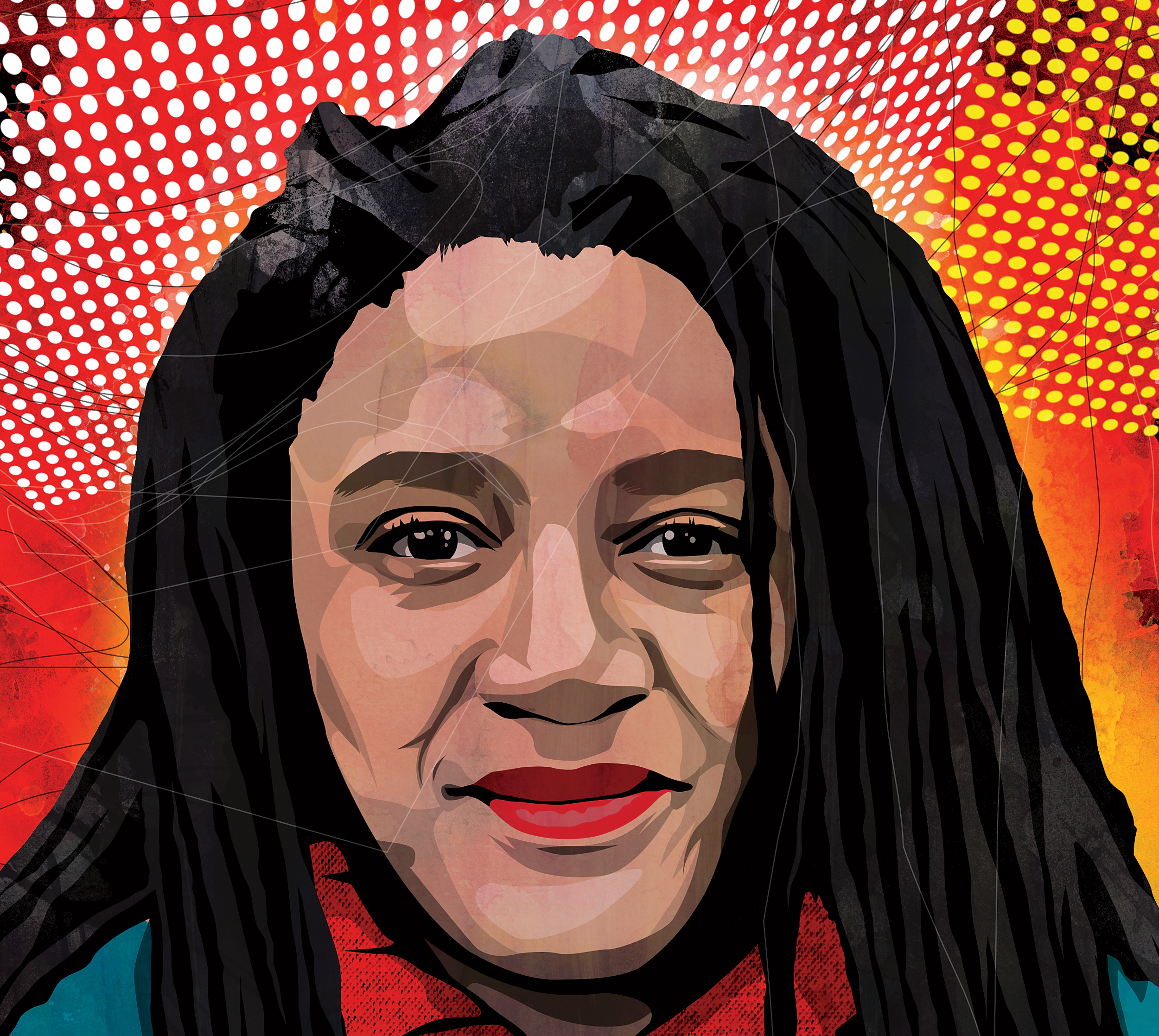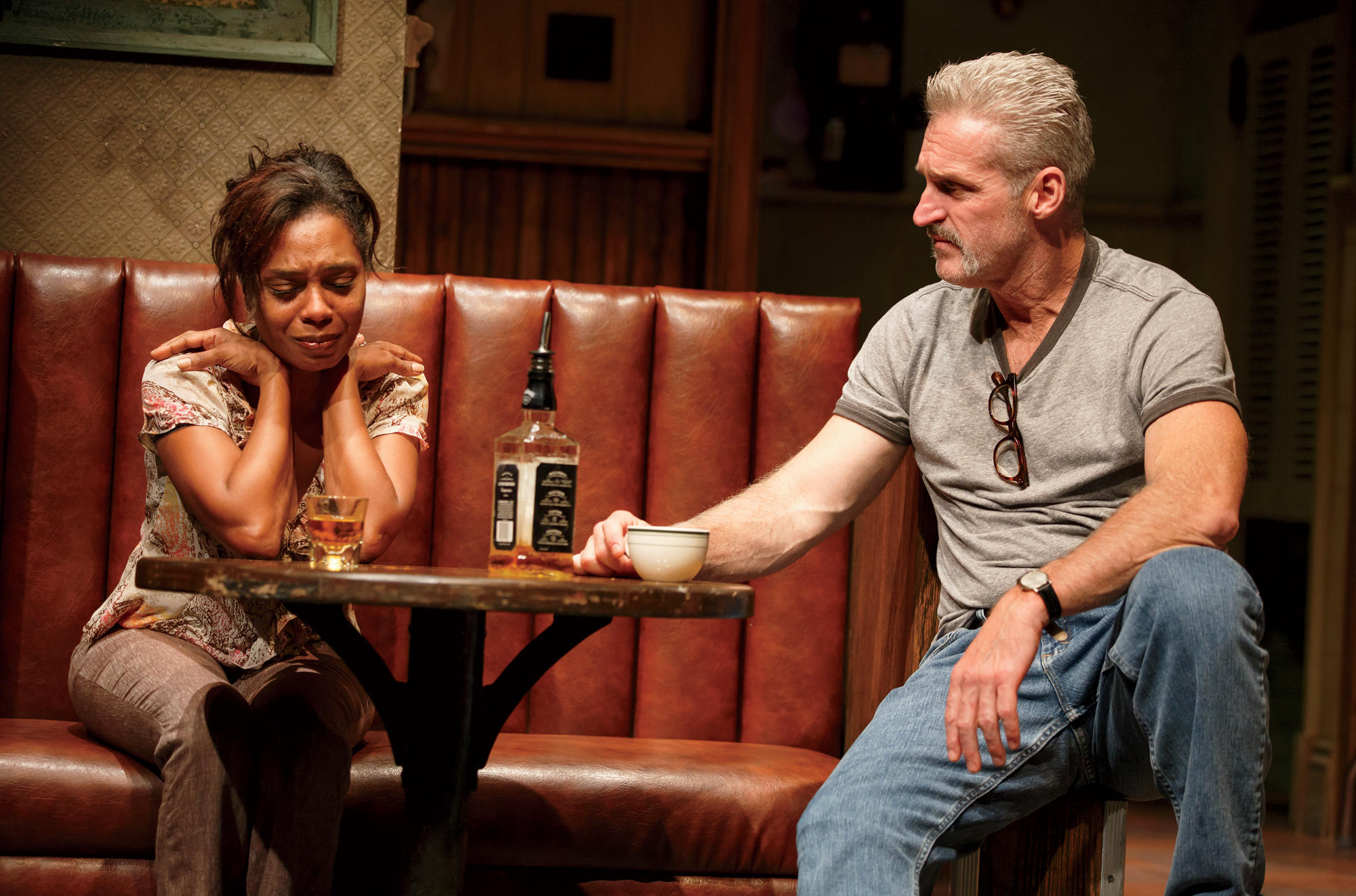
Growing up in Brooklyn in the 1970s, Lynn Nottage loved the stoop culture, with its polyglot mix of working- and middle-class characters hanging out telling tales. “It was a rich storytelling community,” she says of Boerum Hill, where she still lives.
When she wasn’t listening to stories or playing in the streets, Nottage could often be found in the library, reading one book and then “following the trail to another, an adventure with the Dewey Decimal System, weaving around making discoveries.”
Listening and learning — and discovery — have been central to Nottage’s success as a playwright, and were particularly crucial in bringing her latest drama, Sweat, to life. The extraordinarily timely and well-received play, which opens on Broadway this spring, explores the unraveling lives in a working-class community where manufacturing jobs have disappeared. “This compassionate but cleareyed play throbs with heartfelt life, with characters as complicated as any you’ll encounter at the theater today,” wrote Charles Isherwood of the New York Times when Sweat premiered in 2015 at the Oregon Shakespeare Festival. In the Wall Street Journal, Terry Teachout called Nottage “as fine a playwright as America has,” and praised the play’s “raw passion and searching moral consciousness.”
Nottage, a Columbia professor since 2014, is fifty-two and lives in Brooklyn with her husband, filmmaker and fellow Columbia professor Tony Gerber ’95SOA; their children; and her father. They live in the same brownstone in which Nottage grew up, although Boerum Hill, near the Brooklyn Academy of Music and the Barclays Center, has gentrified greatly since the days she rode the graffiti-scrawled subway to school with future writer Jonathan Lethem, who later wrote about the neighborhood in novels like The Fortress of Solitude.
While Lethem’s Fortress was set in the late twentieth century, Nottage’s writing went further back. When cleaning out her grandmother’s brownstone after she passed away, Nottage discovered a passport photo of her great-grandmother, who had been a seamstress a century earlier. Nottage became fascinated by this woman and sequestered herself in the New York Public Library to learn more about her world. The result was Nottage’s 2003 breakthrough play, Intimate Apparel. Set in 1905 on the Lower East Side, the play is about Esther, a lonesome, unmarried seamstress who sews bridal undergarments and dreams of love and marriage.
Nottage’s second play, Ruined, was a big departure, geographically and thematically. Mama Nadi, the business-minded proprietor of a brothel in war-torn Congo, protects but also exploits young girls who have been brutalized in the war. Ruined won the 2009 Pulitzer Prize for Drama.
The origins of Sweat go back to 2011. That year, Nottage received an e-mail from a friend who opened up to her about the hardships she had suffered — economic and psychological — after the 2008 financial collapse. Nottage felt she had to do something. As a writer, that meant searching for the story.
She and her friend went down to Zuccotti Park, where the Occupy Wall Street protesters were encamped, but Nottage knew the real suffering of the economically disenfranchised was unlikely to be found in Lower Manhattan. Not long after, she read an article declaring Reading, Pennsylvania, the poorest city in the nation. Nottage was intrigued by the “de-industrial revolution,” and she saw in that dying city a story crying out to be told.
“All my plays are about people who are marginalized by circumstances,” she says. “The folks on the stage in Sweat are not that different from the folks on the stage in Ruined. These are people who find themselves in the midst of ugly situations, and in order to survive they end up making very compromised choices.”
Armed with a commission from the Oregon Shakespeare Festival and the Arena Stage in Washington, DC, Nottage began traveling to Reading to hear its stories. She spoke with everyone from politicians to business owners to angry, unemployed white steelworkers, who blamed the Latino population for many of their problems and who would soon gain attention during Donald Trump’s presidential campaign. She was accompanied in her visits over the next few years by her husband and by director Kate Whoriskey, who first worked with Nottage on Intimate Apparel, back in 2003, and who traveled with her to Africa for research on Ruined.
“A lot of playwrights have a thesis and set out to prove it, but Lynn is really going out to explore, and she really is eager to listen,” says Whoriskey. “And she’s willing to put herself in situations that other people might find uncomfortable.”
Whoriskey admits that this “period of searching,” in which Nottage sets off in one direction and then pivots to another, “gets a little scary, and you wonder if we will find a story. But Lynn is confident that if you look long enough, the story will come to you.”
Nottage found openness pretty much everywhere she went in Reading. “There was no wariness,” she says. (Locals were also thrilled when they brought the show to town for a staged reading last fall.) “It was, ‘Wow, someone is interested in us; our world exists.’ In New York we take that for granted, but they feel like they are ignored. It’s like a little dose of validation.”
But while everyone was willing to talk, few had much hope, no matter how hard Nottage looked. “I always look for spaces of sunlight, but there were so few pockets of optimism,” she says. So while she was trying to avoid writing “poverty porn,” she did end the show without uplift or even resolution. “I couldn’t end with more resolution because I don’t know what the next step is and the pundits don’t know either.”
At each production — in Oregon, in Washington, and off-Broadway — Nottage and Whoriskey fine-tuned the play; they made a minor tweak in the ending after Election Night but not in the dialogue. “It was a small calibration that had to do with the nature of the stillness on the stage,” Nottage says, adding that while she didn’t think Trump would win, after spending so much time in Reading, she was “surprised that people were surprised that there was so much anger and frustration. The working class has been struggling for a very long time — not just the last eight years but the last twenty years.”
For Broadway, Nottage had to look beyond the script to “the marketing game plan, the art — you have to expand your entire machinery,” and she had to worry about whether her show could fill a 650-seat house instead of a 199-seat one. “That’s kind of daunting,” she says. “But what’s exciting is that 650 people can see the play in one night — if it works.”
Nottage did not have the luxury of focusing on Sweat alone: she is working on a musical adaptation of the film Black Orpheus with director George C. Wolfe and an opera version of Intimate Apparel — all while her father is ill, her daughter has started college, and she has a seven-year-old at home.
“It has been a terribly chaotic time,” she says. “It’s a lot that my brain is processing and a real test of stamina.”
With all those balls in the air, Nottage finds her one other responsibility — teaching at Columbia — to be “a refuge.”
“Strangely, when I go up there and I sit in the classroom, I feel at peace,” she says. Everyone in her life knows that she has set aside her Fridays and cannot be distracted from her two three-hour classes and her independent studies. “In the spring, I also stay afterward, often till ten o’clock, to see the students’ work, but I did ask this semester that they not do two-hour plays without intermissions,” she says with a laugh. “That would break me.”
Managing her life and her Broadway opening is also a teaching tool for her graduate students. “They are curious about it, and I have to be very realistic about what it takes to make a living as a playwright,” she says. “And it really involves being a very adept juggler: you have to be doing multiple things to pay your rent, to pay for your health care. We talk a lot about juggling things and still finding time to write and still finding time for your mental health.”
Nottage, who has been a visiting lecturer at Yale University and elsewhere, says that the Columbia professorship “frees me to be a writer” — a feeling she had experienced in 2007 after winning a MacArthur “genius” fellowship, which came with a $500,000 grant. “That meant freedom from a certain level of anxiety,” she says. “I hadn’t realized how paralyzing it could be and how much time it consumed, worrying about making a living. That liberated me as an artist.” Understanding those stresses also helped inform her writing, especially in Sweat.
And while the play is finished, Nottage is not ready to let go of Reading. She hopes to return there later this spring to mount a multimedia art installation about the city and its people. She’s also setting her next play there. It will take place in 2008 and revolve around locals trying to reclaim their lives after getting out of prison.
While that sounds like another heavy topic, there will also be some lightness. “It’s a little funnier than Sweat, and a little more Buddhist,” she says.
The research should be easier this time around, not just because she has already spent so much time in Reading. “This one is about a sandwich shop,” she adds with a smile. “So eating sandwiches is part of my research.”



